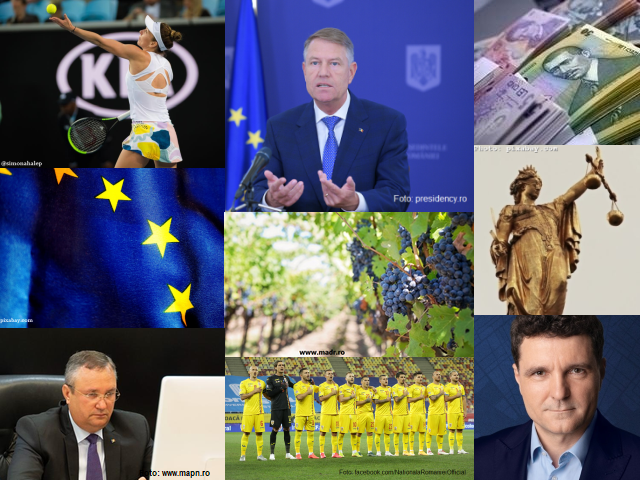The Week in Review – March 14-18 2022
A look back at the top stories in Romania this week.

Daniela Budu, 18.03.2022, 19:34
Major meetings in Bucharest
In the context of the war on Romanias border, President Klaus Iohannis continued this week his series of meetings with Western leaders, as well as presidents from neighboring countries. He reiterated the urgent need to strengthen the entire NATO eastern flank, in the context of this security situation, which the head of state deemed to be very worrying:
“We urgently need the substantial and balanced consolidation of the entire eastern flank, with forward, unitary, and bolstered presence. Which is why Romania acts to continue to increase allied military presence in our country.”
Present in Bucharest, Estonian President Alar Karis said that Estonia and Romania are working together towards common goals in the defense of Europe, and that it is necessary to reduce reliance on Russian energy sources. At the same time, Estonia continues to support sanctions against Russia. After meeting the Romanian head of state, Spanish PM Pedro Sanches underlined that the EU must act quickly against rising prices for gas and electricity, and that the governments in Madrid and Bucharest should work together for urgent measures.
Iohannis also spoke in Bucharest with Bulgarian President Rumen Radev about the grave situation generated by Russias military aggression against Ukraine, as well as about diversifying energy sources and transport routes. The same topics were tackled in talks with Italian Foreign Minister Luigi di Maio. Together they expressed support for passing new sanctions in order to maintain pressure on Russia. Luigi di Maio appreciated the way in which Romania is managing this difficult situation, thanking the country for its solidarity and the support it provides refugees.
During the meetings in Bucharest, Klaus Iohannis pointed out that the neighboring Republic of Moldova needs support from the EU to be able to handle the influx of refugees. Moreover, during his Wednesday trip to Chisinau, he reiterated Romanias full support for settling politically the Transdnestr situation, with respect for Moldovas sovereignty and territorial integrity within its internationally recognized borders, without hurdles in its pro-European aspirations. Moldovan President Maia Sandu said that she needed support from the partners to overcome the challenges brought about by the war in Ukraine. At the same time, she said she appreciated the prompt decision made by the Romanian authorities to open a green corridor for the transfer of refugees going to the EU straight from the Moldova- Ukraine border.
Meantime, tens of thousands of refugees are arriving at the border between Ukraine and Romania, mostly transiting west. Since the beginning of the Russian invasion in the neighboring country, the border was crossed by about half a million Ukrainians.
The authorities are making efforts to support the economy and the population
In the context of the war on Romanias border, and the speculations that it gave way to, the authorities are discussing the measures needed to support the economy and the population against rising prices for energy, fuel, and food. Agriculture Minister Adrian Chesnoiu assured everyone that there was no risk of a food crisis, or of major imbalances to this effect, and added that Romania may even have the capacity to export. Minister Chesnoiu told Radio Romania that the pandemic and the rising energy and gas prices have affected the entire economy, not just farming:
“In terms of stocks, Romania is safe. First of all, we have enough food and grain in the state reserves, so that a crisis does not emerge before the new harvest. Major quantities of wheat and sunflower oil are in the stores of farmers and processors, as well as in storage with grain traders, and this will cover our consumption needs until the new harvest.”
On the governing coalition agenda this week there was eliminating VAT for foodstuffs, setting a ceiling on energy prices, and reducing fuel excises. The executive announced it would prolong by another year the measures to support the population, including said ceiling on energy and gas prices.
Rising in COVID cases in Romania
After the state of alert was lifted on March 9, no restriction against COVID is in effect anymore, and no rule is being imposed to prevent the spread of the coronavirus. Infections are on the rise after more than a month of an descending trend. Thousands of cases have been recorded per 24 hours. The authorities announced that the same situation has been noted in other European countries too, after the lifting of restrictions, but without a significant increase in the number of grave cases or deaths associated with the virus. The number of patients in hospitals is going down to half compared to the first part of the month, but a few hundred people are still in the ICU, diagnosed with COVID-19, while the number of deaths is a few dozens.
Inflation is on the rise
Considering that prices have been going up for the last month in Romania for all types of foodstuffs, non-food items, and services, the annual rate of inflation went up to over 8.5 percent, according to the National Institute of Statistics. The experts say that the effects of inflation will be felt by the population in terms of income, as well as by the economy at large, which continues to be largely consumption based. National Bank spokesperson Dan Suciu remarked that this is a general phenomenon, and that the rise is relatively small compared to last month, and significantly lower than in other countries in the region. According to Suciu, Romania is now at the half of the list of EU countries, considering that last year it had the highest inflation.




























